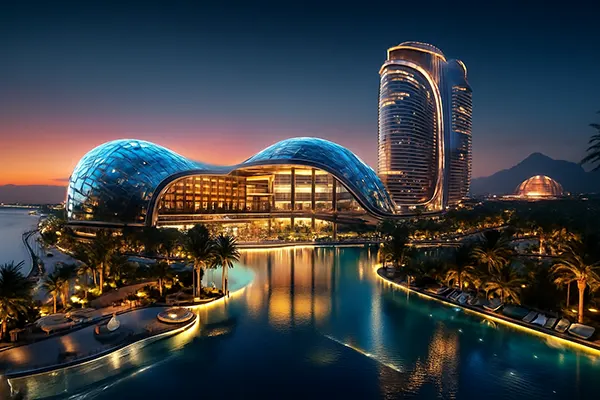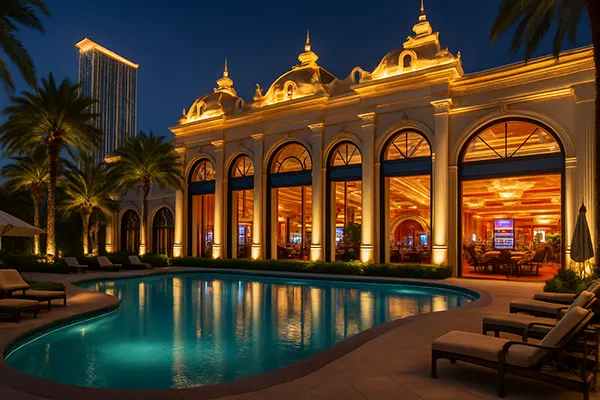
The Future of Luxury in the Casino Industry: Trends for 2025–2030
The premium gambling segment is entering a period of rapid transformation driven by advanced technology, refined guest expectations and shifts within global tourism. Between 2025 and 2030, high-end casino destinations will develop new standards that extend well beyond traditional comfort. Investors and players will increasingly encounter venues built around sustainability, hyper-personalised services and immersive entertainment formats supported by fast-evolving digital tools.
Key Luxury Trends Shaping Premium Casino Development
AR and VR are becoming central tools for next-generation entertainment. Luxury venues use them to enhance architectural design, create interactive spaces and extend the experience beyond the physical floor. In 2025, major projects in the United States, Macau and Singapore are already incorporating mixed-reality lounges and private VR-rooms where visitors can participate in custom scenarios that complement the physical play environment.
Personalisation is also becoming a strategic priority. AI-driven systems support tailored hospitality programmes, loyalty benefits and individual service journeys. By analysing visitor habits, casinos allocate personalised offers, room settings, dining recommendations, and even individual entertainment schedules. The goal is to increase long-term value by turning every visit into a curated, consistent experience.
Sustainability has changed from a trend to a mandatory requirement. New luxury resorts adopt green construction materials, low-emission cooling systems and circular-economy principles. Operators are investing in energy-efficient lighting, water-saving technologies and transparent ecological reporting to meet expectations from regulators and environmentally aware travellers. The more environmentally responsible a venue is, the stronger its competitive position becomes.
How Technology Enhances the Premium Guest Journey
Technological upgrades have shifted from secondary support tools to core parts of customer strategy. Biometric access, automated concierge systems and AI-powered service desks reduce waiting times and improve privacy. These technologies help create smoother movement across the resort and provide a higher level of comfort for VIP customers.
Another important area is the adoption of blockchain-based systems for transparency and trust. Luxury operators are exploring secure identity management solutions and transaction-verification systems that align with 2025 regulatory standards. This allows international visitors to access premium entertainment options more easily with minimal bureaucratic steps.
The integration of robotics is gradually becoming more visible. Resorts in Japan, South Korea and the Gulf states are testing autonomous service robots that support logistics, personalised delivery and room-service operations. Their purpose is not to replace staff but to remove routine tasks and allow human specialists to focus on high-quality personal interaction.
Regions Leading the Expansion of High-End Casino Resorts
Several markets are gaining traction as new centres of premium gambling tourism. Saudi Arabia is advancing flagship entertainment clusters under its Vision 2030 strategy, with openings planned in the Red Sea region that combine coastal tourism with exclusive high-end hospitality. These projects aim to compete with established Asian and American destinations.
Macau continues to invest in diversification, moving beyond traditional gaming towards cultural, wellness and business-tourism formats. Operators are renovating existing resorts and adding fine-dining spaces, art installations and long-stay VIP facilities. By 2030, Macau is expected to strengthen its position as a global luxury leader.
In Europe, Spain and Cyprus remain important for premium tourism development. Integrated resorts in Limassol and Madrid emphasise wellness, gastronomy and event-focused travel. These destinations aim to attract guests seeking a refined combination of entertainment, culture and coastal leisure.
What These Trends Mean for Players and Investors
For players, the rise of high-end destinations means more emphasis on comfort, privacy and exclusive experiences. Visitors can expect personalised travel support, curated entertainment programmes and advanced digital tools that make their stay more efficient. Luxury casinos in 2025–2030 aim to create a seamless journey from check-in to departure.
For investors, the market signals stable long-term potential. Countries opening new tourism clusters are offering favourable regulatory conditions, while mature markets look toward diversification and sustainable modernisation. Investment strategies increasingly prioritise innovation capacity and environmental compliance.
Another important factor is the expansion of international partnerships. Technology providers, hotel brands and entertainment companies are forming joint ventures to develop large-scale integrated destinations. These collaborations reduce risks and enhance the global competitiveness of premium resorts.

How the Concept of “Luxury Casino” Will Change by 2030
The traditional definition of luxury—grand interiors, status dining and exclusive rooms—will expand significantly. Between 2025 and 2030, luxury will be associated with intelligent design, high environmental standards and hybrid entertainment spaces. Guests will expect privacy, personalisation and efficiency supported by technology.
Emotional value will become a central focus. Resorts will design environments that support comfort, authenticity and connection. Whether through private cultural events, boutique wellness programmes or mixed-media art exhibitions, the emotional dimension will play a vital role in the perception of premium quality.
By 2030, the most successful luxury casinos will be those that combine innovation with discretion. They will offer advanced digital tools while maintaining refined personal service, sustainable architecture and a balanced approach to entertainment. The future premium resort will be a multifunctional environment shaped around individual preferences and global ecological standards.
Why Luxury Casinos Must Adapt Rapidly
The pace of global change requires operators to renew their strategies more frequently. Visitor expectations grow consistently, and international competition encourages investment in high-quality service, design and security. Without long-term planning, it becomes difficult to maintain a premium image.
Resorts must also respond to evolving regulations. Governments increasingly prioritise environmental protection, responsible gambling frameworks and transparent operational standards. Strong compliance supports trust and improves the reputation of high-end destinations.
The final driver is the transformation of global tourism. Travellers now choose destinations that offer a combination of comfort, culture and technological convenience. Premium casinos that successfully integrate these values will secure a leading position over the next decade.
